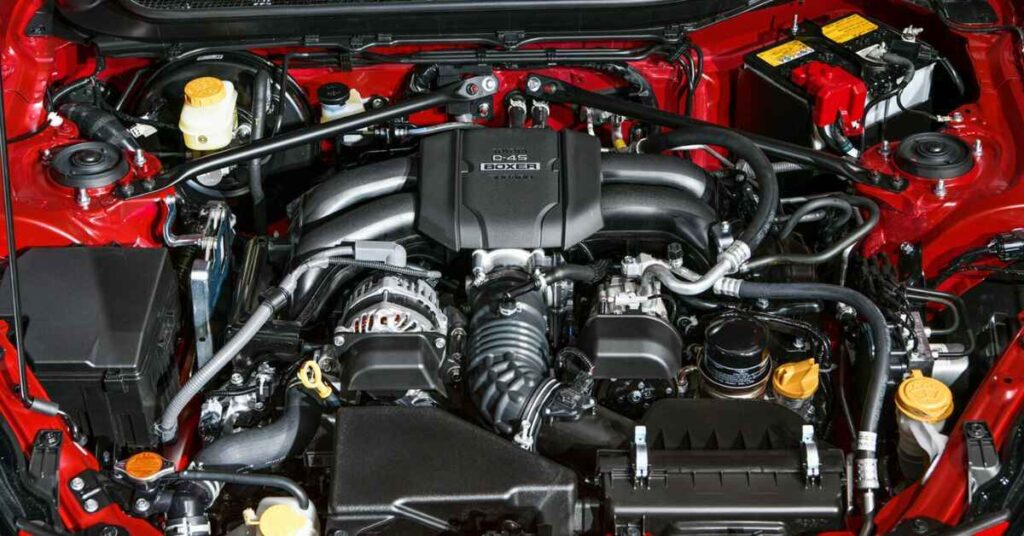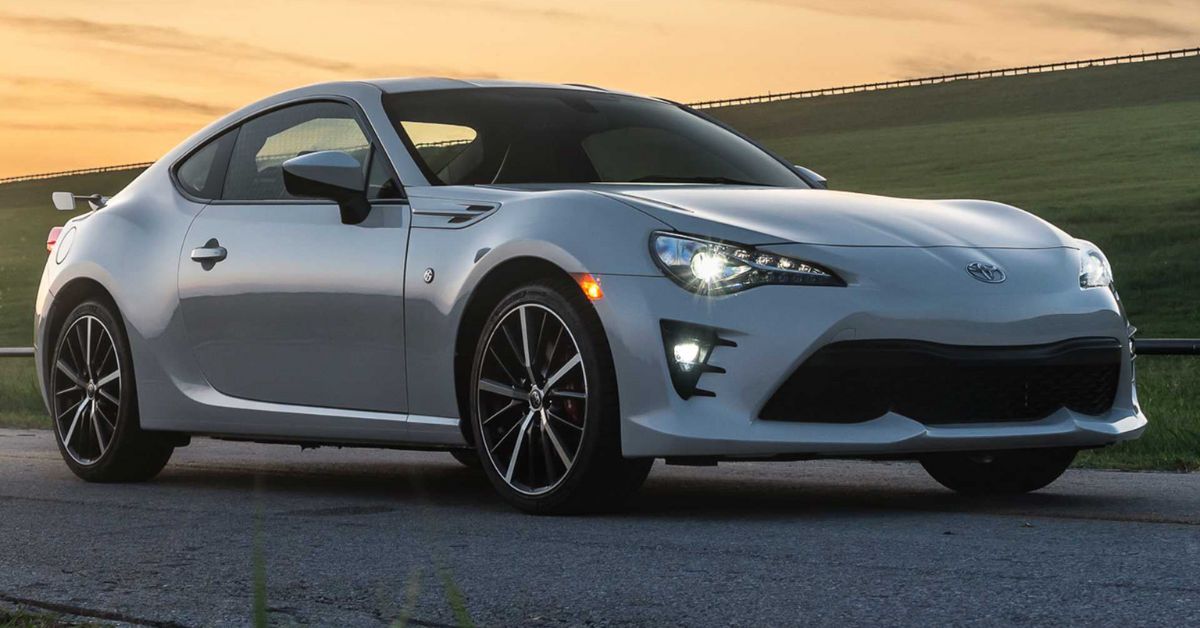Ever wondered what makes the Toyota 86 tick? You’re not alone. This sleek sports car has captured the hearts of driving enthusiasts across the USA, and its engine configuration is a big part of the magic. Let’s pop the hood and take a closer look at what makes the Toyota 86’s engine so special. What is the Engine Configuration of the Toyota 86?
Toyota 86 Engine: The Boxer Beauty

At the core of the Toyota 86’s appeal lies its unique engine setup. But what exactly are we dealing with here?
The Boxer Engine Explained
The Toyota 86 sports a boxer engine, also known as a flat or horizontally opposed engine. Picture this: instead of cylinders standing upright like soldiers, they’re lying flat, throwing punches at each other. That’s your boxer engine in a nutshell.
Why does this matter? Well, this horizontal layout brings some serious perks to the table:
- Lower center of gravity: The engine sits lower in the chassis, keeping the car planted on the road.
- Better balance: With cylinders opposing each other, vibrations are naturally canceled out.
- Improved handling: That low center of gravity? It translates to sharper turns and more stable cornering.
Toyota 86 Horsepower: Power Meets Efficiency
Now, let’s talk numbers. The Toyota 86 isn’t about raw power – it’s about balance. Here’s what you’re looking at:
- Horsepower: 205 hp (with manual transmission)
- Torque: 156 lb-ft
- Engine size: 2.0-liter flat-four
Compared to some muscle cars, these numbers might seem modest. But remember, the 86 isn’t trying to win drag races. It’s built for the joy of driving, pure and simple. What is the Engine Configuration of the Toyota 86?
Performance: Where the Rubber Meets the Road
Boxer Engine: The Low-Slung Powerhouse
The boxer engine in the Toyota 86 isn’t just about numbers – it’s about feel. Thanks to its low position in the car, the 86 boasts a center of gravity that’s lower than some supercars. This translates to:
- Incredible stability in corners
- Responsive steering
- A connected feeling to the road
In terms of raw performance, you’re looking at:
- 0-60 mph: Around 6.5 seconds
- Top speed: Approximately 140 mph
Not too shabby for a car that’s more about finesse than brute force, right?
Rear Wheel Drive: The Purist’s Choice
Pairing that boxer engine with rear-wheel drive (RWD) is like matching fine wine with gourmet cheese – it just works. Here’s why RWD matters in the 86:
- Better weight distribution: With the engine up front and power going to the rear, the car maintains a near-perfect balance.
- Improved handling: RWD allows for a better steering feel and more precise cornering.
- Fun factor: Want to slide around a bit? RWD makes controlled drifts a possibility (on a closed course, of course!).
Toyota 86 Specs in Detail: The Numbers Don’t Lie
Let’s break down the Toyota 86’s specs in a handy table:
| Specification | Details |
|---|---|
| Engine Type | 2.0L Flat-4 Boxer |
| Horsepower | 205 hp @ 7000 rpm (MT) |
| Torque | 156 lb-ft @ 6400 rpm |
| Transmission | 6-speed manual or 6-speed automatic |
| Drivetrain | Rear-Wheel Drive |
| Curb Weight | 2,776 lbs (MT) |
| Fuel Economy | 21 city / 28 highway mpg (MT) |
| Length | 167.9 inches |
| Width | 69.9 inches |
| Height | 50.6 inches |
| Wheelbase | 101.4 inches |
Design: Form Follows Function
Low, Aerodynamic Stance
The Toyota 86’s boxer engine doesn’t just influence its performance – it shapes its entire design. That low-slung look isn’t just for show. The flat engine allows for a lower hood line, which in turn:
- Reduces frontal area for better aerodynamics
- Improves driver visibility
- Contributes to the car’s aggressive, sporty appearance
Driver-Focused: The Cockpit Experience
Step inside the 86, and you’ll find a cockpit that’s all about the drive. The low-mounted boxer engine allows for a lower seating position, putting you right in the heart of the action. Key features include:
- A small-diameter, leather-wrapped steering wheel
- Well-placed pedals for easy heel-toe shifting
- A short-throw gear lever (in manual models)
Every aspect of the interior is designed to complement the car’s performance characteristics. What is the Engine Configuration of the Toyota 86?
Rear Passenger & Cargo Space: Practicality Meets Performance
While the Toyota 86 is primarily a driver’s car, it doesn’t completely forget about practicality. The rear seats, while snug, can accommodate passengers in a pinch. The trunk, while not huge, offers enough space for a weekend getaway or a grocery run.
Technology: Modern Touches in a Driver’s Car
Touchscreen Display Audio
The 86 might be focused on driving purity, but it doesn’t skimp on modern conveniences. The touchscreen display offers:
- Bluetooth connectivity
- USB input
- Available navigation
These features integrate seamlessly with the car’s performance-oriented nature, providing information without distraction.
Backup Camera: Safety Meets Convenience
A standard backup camera adds an element of safety and convenience, especially given the car’s low seating position and limited rear visibility.
Safety: Protecting the Thrill
Safety isn’t forgotten in the pursuit of performance. The Toyota 86 comes equipped with:
- Vehicle Stability Control
- Traction Control
- Anti-lock Braking System
- Smart Stop Technology
These systems work in harmony with the car’s balanced chassis and responsive engine to keep you safe while you enjoy the drive. What is the Engine Configuration of the Toyota 86?
Conclusion
In conclusion, the engine configuration of the Toyota 86 is a crucial part of what makes this car special. Its boxer layout, combined with rear-wheel drive and a focus on balance over raw power, creates a driving experience that’s truly unique in today’s market. Whether you’re carving up canyon roads or just running errands, the 86’s engine ensures you’ll be doing it with a smile on your face.
So, next time you see a Toyota 86 zipping by, you’ll know there’s more to it than meets the eye. It’s not just a car – it’s a finely tuned instrument, designed to deliver pure driving pleasure. And at its heart? A boxer engine that punches well above its weight.
FAQs
A: No, the 86 uses a naturally aspirated engine. This choice was made to keep the engine’s response linear and predictable.
A: The engine is a Subaru design, part of Toyota’s collaboration with Subaru on this platform.
A: Absolutely! The 86 has a huge aftermarket following, with options for everything from mild tune-ups to full engine swaps.











